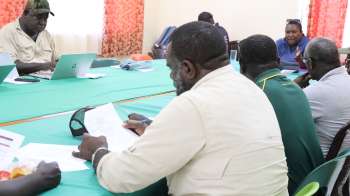ABG conducts stakeholder awareness meetings on Panguna EL01

The Autonomous Bougainville Government (ABG) has commenced targeted stakeholder awareness meetings in Arawa this week, following its recent statement clarifying the Government’s position on Panguna EL01 and partnering arrangements involving Bougainville Copper Limited (BCL) and Lloyds Metals and Energy Ltd (LMEL).
The awareness program is being led by the ABG Department of Mining & Petroleum (DMP) in collaboration with the Department of Community Government. The meetings are aimed at ensuring stakeholders are briefed on recent developments and the Government’s position regarding the future of the Panguna EL01 exploration project.
On Tuesday, 17 February 2026, ABG officials met with government authorities operating in the Panguna and Kieta Districts, including ward members from the Ioro Community Government. The meeting focused on ensuring public servants and local government networks are informed of the latest developments concerning the Panguna project.
The ABG emphasized the importance of coordinated communication so that accurate information is conveyed clearly to communities and stakeholders throughout the region.
Following this engagement, ABG officials met with Panguna landowners today in Arawa, through their representative body to provide an update on developments relating to BCL, LMEL, and EL01. The ABG reaffirmed its commitment to ensuring that landowner interests remain central to all discussions concerning the future of Panguna.
Landowner representatives expressed their views and presented key issues and priorities for consideration moving forward. The ABG welcomed the engagement and reiterated its commitment to ongoing dialogue, transparency and collaboration with customary landowners.
Stakeholder engagement will continue as part of the ABG’s efforts to maintain clarity, unity and informed participation in matters relating to the Panguna project.
The ABG encourages all stakeholders and members of the public to rely on official Government communications for accurate information as discussions on Panguna progress.
[ Back to News ]





